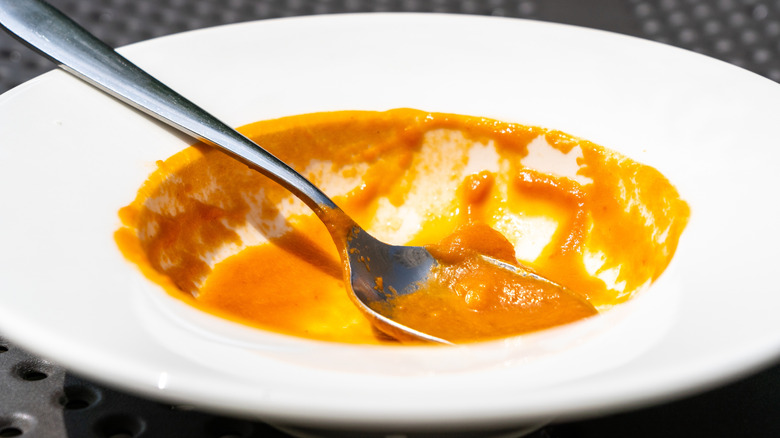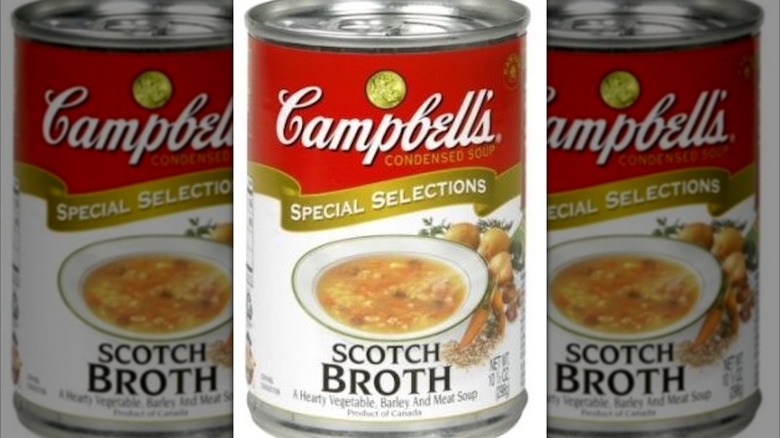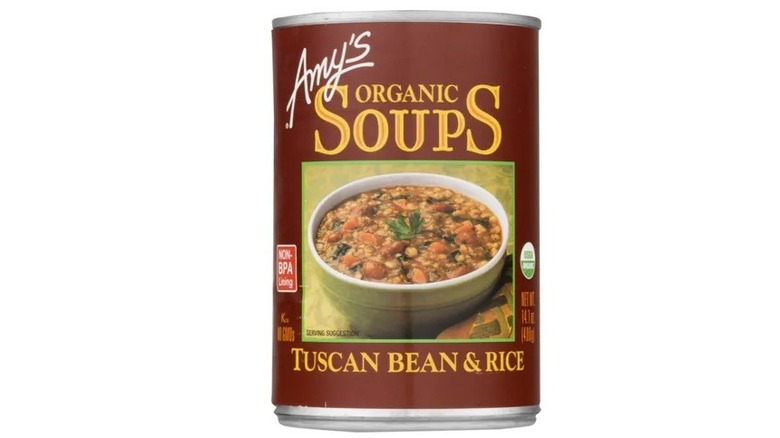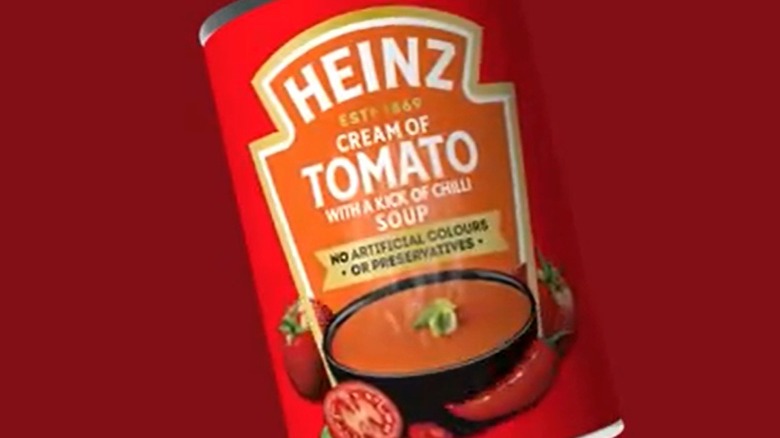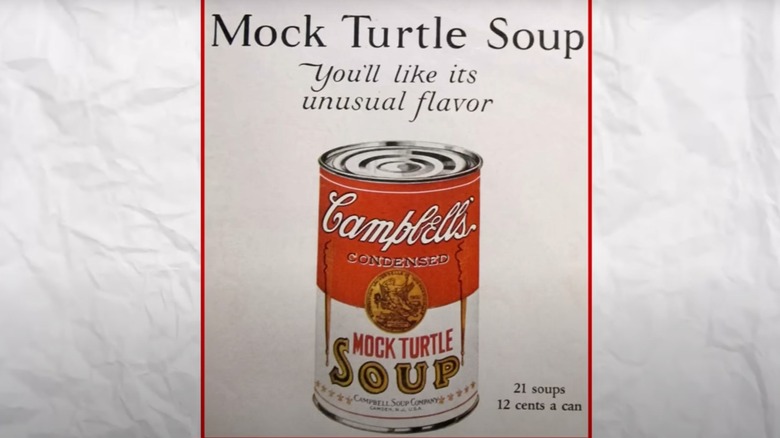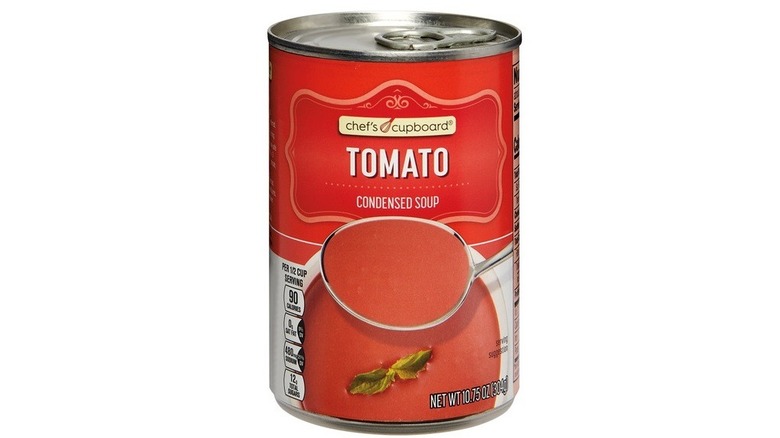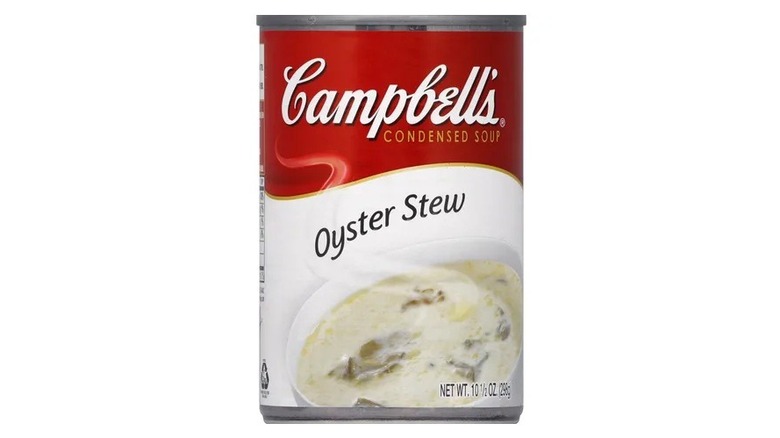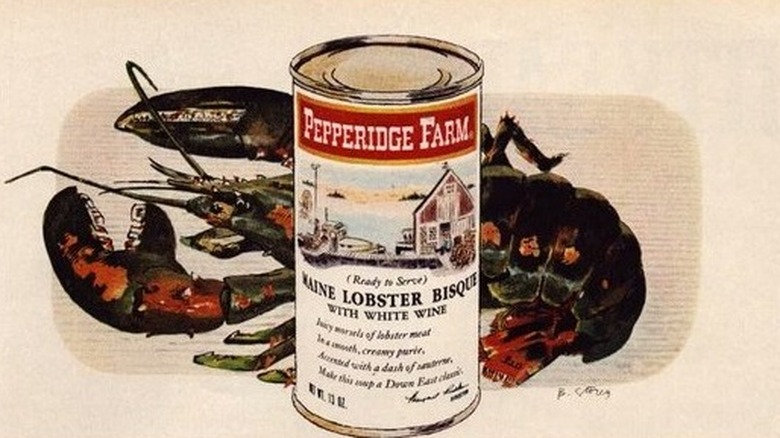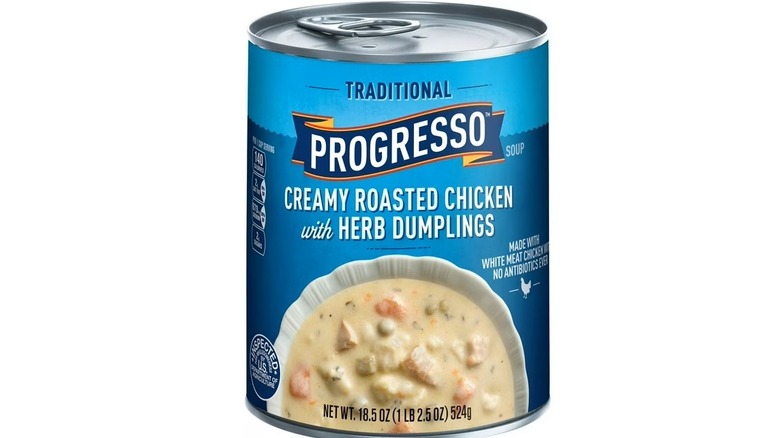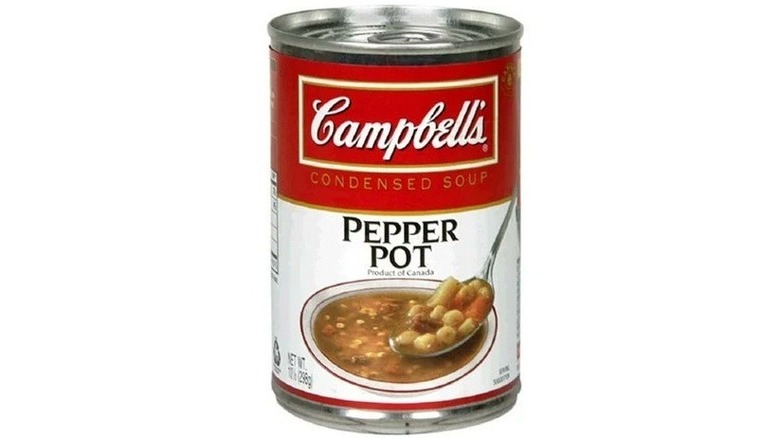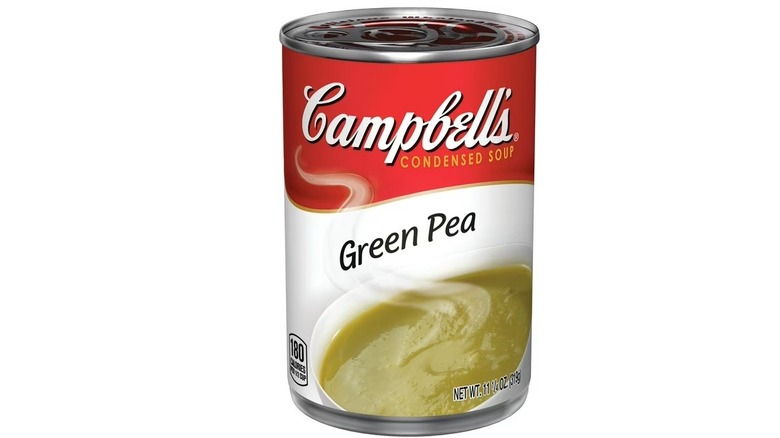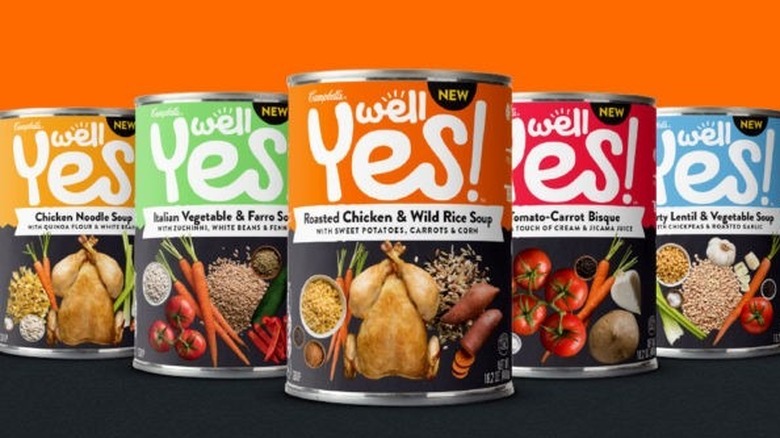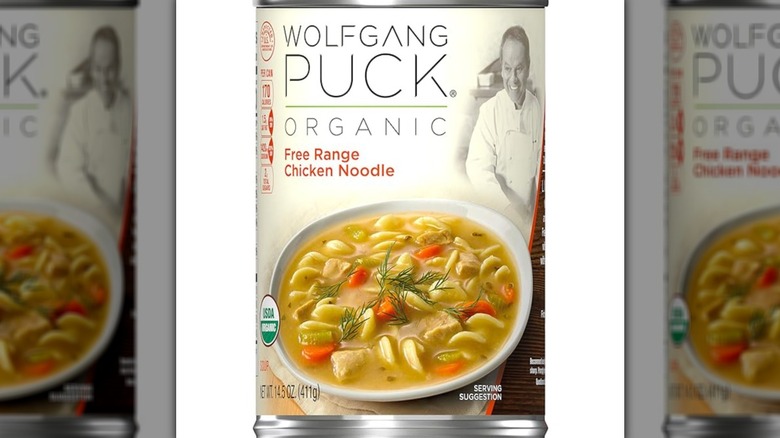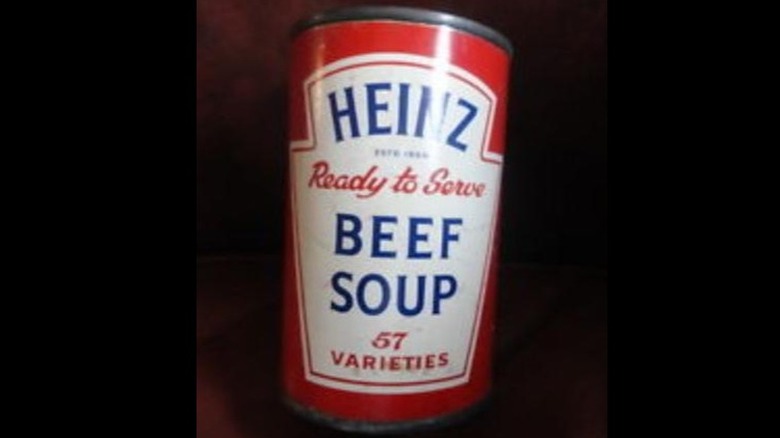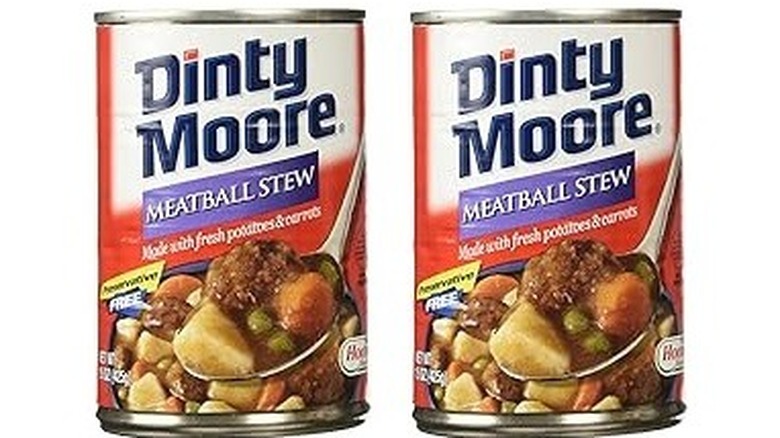14 Discontinued Canned Soups We're Probably Never Getting Back
Some foods do more than fill stomachs and provide nutrition. For example, soup has powers that extend beyond the bowl; it heals and comforts like almost nothing else. From thick, hearty soups you can almost slice, to flavorful broths and consommés that are lighter than air — soup always delivers. It's a universal food, adored by meat-eaters and vegetarians alike, and a form of food that is seen in almost every culture around the globe.
When soup was put in a can, it created one of the greatest food marriages of all time. Suddenly a smorgasbord of flavors were at your fingertips in the supermarkets that could be quickly dished up at home. But what happens when your favorite varieties of soup disappear from the shelves, never to be seen again? Let's pay homage to 14 discontinued canned soups that initially made a splash, but are unlikely to make a comeback.
Campbell's Scotch Broth
Campbell's long and proud history of canning soup dates back to 1897, with the iconic red and white label appearing the year after. In 1922, the business was officially renamed the Campbell Soup Company, a moniker that lasted until 2024, when the word "soup" was removed after a shareholder vote, to reflect the wider range of products it sold. While many were surprised by the decision, it wasn't the first time Campbells had ditched something popular.
The year before the change of name, the company devastated fans of its Scotch broth by confirming via social media it had been discontinued. Made with lamb, mutton, vegetables, and pearl barley, Scotch broth was beloved among soup fans. In the days before it was — ahem — canned, one eGForums poster wrote: "It was better than any soup in the then Campbell's repertoire by a caber toss." The company has tried to soften the blow by posting a recipe for traditional Scotch broth on its website that customers can make at home, though it will take longer than cracking open a can.
Amy's Tuscan Bean and Rice soup
For almost 40 years, Amy's Kitchen has been producing a range of foods that taste delicious. In 1999 the company started making soups and when they did, they took off in a big way. Made with up to 95% organic ingredients and famously cooked from scratch, for many people Amy's soups are as close as they can get to being home-made, in the convenience of a can.
While it hasn't all been plain sailing – the company was at the center of worker safety allegations in 2024 and their cans don't come cheap – Amy's range of 35 soups has found a place in millions of people's hearts. One of the best-loved was the Tuscan bean and rice soup: A combination of organic vegetables and Borlotti beans, with brown rice and herbs. While there's no definite date when it was discontinued — it was still being advertised in 2020 on Facebook – it appears the Tuscan bean and rice soup was replaced with a red bean and vegetable variety.
Heinz Cream of Tomato Soup with a Kick of Chilli
We have the Paris World Fair in 1900 to thank for today's range of soups from Heinz. That event saw Campbell's win the gold medal in the soup category, prompting Heinz to start working on its own products and sparking a rivalry that has lasted to this day. Although best known worldwide for its classic ketchup and other condiments, Heinz is also renowned for its soups, especially in the United Kingdom, where they were first sold through the prestigious store Fortnum & Mason.
While its range is now found in almost every store, from major supermarkets to mom & pop shops, in 2023 there was uproar when Heinz pulled the plug on one particular spicy variety: Cream of tomato soup with a kick of chilli. In a post on X, Crispy asked: "I bet you have loads in a warehouse somewhere, if it's all getting chucked can you at lease [sic] send me a crate? Be a mate." When the brand replied there was none left, the response was: "Let me know if whatever monster who made this decision comes to it's senses and my soup makes a comeback." So far: Crickets.
Campbell's Mock Turtle soup
You could be forgiven for wondering why anyone would want a spoonful of mock turtle soup to begin with, but all is not quite as it seems inside this Campbell's can. In the second half of the 19th century, turtle soup was all the rage in the United States, both among the political elite and in the South.
While mock turtle soup — made from an entire calf's head — and the real thing were offered in fancy restaurants for years, the fake variety briefly came into its own in the inter-war years, as the U.S. government tried to persuade people to eat more offal. The recipe for Campbell's mock turtle soup heeded the call, including cubes of calf's head meat in a smooth blend of tomatoes, beef broth, celery and herbs. While genuine turtle soup remained a luxury menu item until the 1970s in some parts of the world, the mock version fell out of favor after World War II, though you can still buy the Worthmore brand online.
Aldi Chef's Cupboard Tomato soup
For Costco regulars, Kirkland Signature is your go-to brand. Devotees of rival chain Aldi seek out the Chef's Cupboard range, which takes in everything from stocks to stuffing mixes. It also includes two soups, but one particular favorite isn't among them, much to many customers' chagrin.
In 2023, a plaintive appeal was sent out on X, as a shopper asked Aldi USA about the availability of the company's canned tomato soup, which they said was less sweet than Campbell's, as well as chicken noodle variety. The Aldi chain replied: "It's a seasonal item, but guess what? It's returning this September. Unfortunately, no plans for the chicken noodle just yet!" The bombshell made the tabloid headlines and while fans can look at cans of Chef's Cupboard Tomato soup on the Aldi website, they also stated these cans may not be available in stores.
Campbell's Oyster Stew
It's hard to imagine these days but in the United States in the 19th century, the luxury food oysters were as commonplace as eggs, and were even grown in New York City. Tragically, urban oyster beds located close to human waste was a recipe for disaster, and the shellfish was blamed for a 1924 outbreak of typhoid that affected 1,500 people across New York, Chicago, and Washington D.C.
Happily, none of that prevented Campbell's from making a frozen oyster soup, launched around 1954, which then evolved into the fresh variety in a can. It became one of the brand's range to be forever immortalized by Andy Warhol, and many people loved the delicious, hearty mix of oysters, cream, and spices.
In June 2012, the Food & Drug Administration demanded products made with fresh, frozen, or cooked Korean shellfish be taken off the shelves amid concerns about unsanitary conditions. The order included oysters, and Campbell's duly complied. In September the same year, the company confirmed via X that its Oyster Stew was discontinued.
Pepperidge Farm Maine Lobster Bisque
Most canned soups come in two types: smooth as silk or chunky and hearty. Their purpose is to deliver flavor and warmth, quickly and conveniently. Pepperidge Farm did things very differently with their range of canned soups. Sold between 1965 and around 1971 they were very firmly at the higher end section of the food aisle, taking rich dishes and ingredients and putting them — and the gourmet experience they evoked — in a can.
The distinctive white cans contained flavors including New England clam chowder, country mushroom with white wine, black bean and sherry, chicken curry, and petite marmite. Arguably the fanciest of all was Pepperidge Farm's Maine lobster bisque, which featured real lobster in a buttery soup with a dash of Sauterne wine.
One theory about why this upmarket range vanished not long after Pepperidge Farms was bought by Campbell's was floated by Discontinued Foods! on X: "... these were simply higher end Campbell's soup recipes that could be sold under the PF label to justify a higher price."
Progresso Creamy Roasted Chicken with Herb Dumpling soup
"Enjoy the classic, comforting taste of chicken dumpling soup with carrots, celery and white meat chicken," says the Progresso website. That's easier said than done. Whether you try to buy it from the brand's own site or via a chain store, it's either unavailable or there's a "temporary" issue with the order. Depending on where you live in the United States, you may be able to get your hands on a can of Progresso's creamy roasted chicken with herb dumpling soup, or you might not.
While there's been no official word about this variety being discontinued, it could be it's among the 40 soups that fell victim to a cull announced in 2020 by General Mills chief executive officer, Jeffrey Harmening. The company, which owns the Progresso brand, decided to focus on best-selling products, after the supply chain issues highlighted during the pandemic. Whether this warming comfort food returns to nationwide availability remains to be seen.
Campbell's Pepper Pot soup
It takes a cold, cold heart to discontinue a product that has been going strong for 111 years but, as many of us know, business is business. Campbell's Pepper Pot soup was first launched in 1899 and became loved by millions over the decades. The basic blend of carrots, potatoes, and onions was combined with beef tripe – sometimes known as white offal – jalapeño peppers and red pepper flakes for a truly warming bowlful.
Residents of Philadelphia are familiar with pepper pot soup as an amazing street food, with its roots firmly in Caribbean cooking. While Campbell's canned soup tapped into that love of exotic tastes and dash of heat for more than a century, in 2010 it was abruptly discontinued, amid low customer demand, according to the company. Campbell's pepper pot soup may be no more but you can buy an Andy Warhol screenprint or rustle up one of the many copycat recipes online. You might even want to try your hand at one of these 100 Year Old Recipes You Can Still Make Today.
Campbell's Green Pea
Vegetarians across the United States were furious when, in 2019, Campbell's confirmed on social media that its green pea soup was discontinued. This simple, yet flavorful soup, combining split peas, water, flour, celery, and onion extract, with a dash of seasoning, was initially created by 19th century French-Canadian workers. Over the decades, it became popular for its mild taste and absence of meat.
Unfortunately, when Campbell's introduced Split Pea with Ham and Bacon soup, it flew off the shelves, leaving its veggie predecessor to fall behind in the sales stakes. When the axe eventually fell, Campbell's at least offered a replacement. In a post on X, the company said their Habitant French Canadian Pea Soup is an alternative that customers might enjoy.
Campbell's Well Yes! soups
Novelty is a major driver of the food industry, as both consumers and brands look for the Next Big Thing. Campbell's thought they'd hit on it in 2017, with the launch of Well Yes!, a line of ready-to-eat soups boasting fancy ingredients such as quinoa and kale.
Created by women who worked for Campbell's, the range had eight flavors, including Italian vegetable with Farro, tomato carrot bisque and chicken noodle. Hopes were high that the healthy soups with their colorful branding would boost the firm's Americas Simple Meals and Beverages segment, which had seen a slowdown in sales.
Unfortunately it was not to be. The Well Yes! range disappeared from shelves and in 2023, Campbell's confirmed it had been discontinued after a query about the carrot and ginger variety on X. The company wrote that they appreciated customer feedback. With a blank page on Campbell's site where the Well Yes! product information used to be, it's not going to be anytime soon.
Wolfgang Puck Organic Free Range Chicken Noodle soup
Not everyone can get to a Wolfgang Puck restaurant, but in 1997 he teamed up with Country Gourmet Foods to produce a line of canned soups, making his culinary genius available to all. Devotees loved the organic free range chicken noodle soup in particular, with one online customer saying it reminded them of the soup their great grandmother used to make. Eye-wateringly high sodium levels aside, its organic ingredients appealed to sustainable soup lovers.
Then, in 2008, Country Gourmet Foods sold the Wolfgang Puck soup business to Campbell's. Denise Morrison, president, Campbell's North America Soup, Sauces and Beverages, said at the time: "The Wolfgang Puck brand fits nicely with our focus on simple meals and offers a solid path to extend our wellness offerings." Between then and now, the Wolfgang Puck range, including the organic free range chicken noodle soup, disappeared, presumably another casualty of the fierce battle for supremacy in the supermarket soup business.
Heinz Beef soup
Many of us look back to our childhoods and wistfully think about foods we loved then but have long since vanished from supermarket shelves. While nostalgia is great, it's fair to say most people can move on and find another foodie favorite. That's not the case for the dedicated (and persistent) devotees of Heinz beef soup. Not to be confused with Heinz beef broth, which is available to buy, this specific variety was discontinued in the early 2000s.
Undeterred, a group of British fans have campaigned relentlessly for its return ever since. The Facebook group Bring back Heinz Beef Soup! has more than 720 members, who continue to lobby the company to start making their beloved soup again. All this, despite numerous members having been told by Heinz that they stopped manufacturing that variety. One Facebook commenter even suggested using the Freedom of Information Act to require Heinz to release the recipe, after the brand declined to share it with them.
Dinty Moore Meatball Stew
When is a soup not quite a soup but everyone thinks it is anyway? When it's a can of Dinty Moore Meatball Stew. Made by Hormel, it was among a line-up of canned foods that stretched all the way back to 1935 and a beef and vegetable medley called Dinty Moore Beef Stew. The brand was named after a comic strip diner that inspired a chain of restaurants with the same name. Hormel slapped it on a can and the Dinty Moore range was born.
The beef stew has stood the test of time, but the same can't be said of its meatball stablemate. It contained vegetables including peas, carrots, and potatoes in a warming gravy/broth, but instead of steak, processed meatballs provided the meat protein. Although it was manufactured for years, Dinty Moore Meatball Stew remained under the radar, before being discontinued around 2010.
